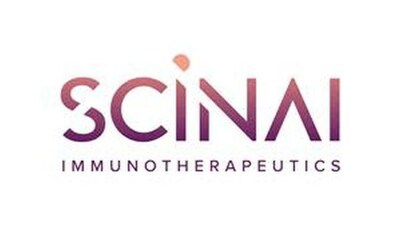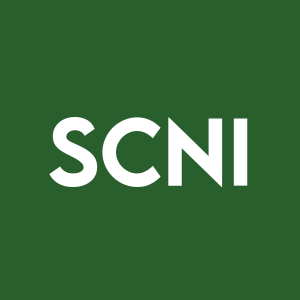Study published in Antiviral Research supports promise of Scinai Immunotherapeutics' coronavirus NanoAb as aerosolized prophylactic and therapeutic drug
- None.
- None.
Insights
Analyzing...
Data backs use of Scinai's aerosolized NanoAbs as a platform for the treatment of hyperinflammatory viral diseases, addressing significant medical needs

The article discusses a new generation of anti-SARS-CoV-2 NanoAbs, also known as nanobodies or VHH antibodies, developed in a research collaboration between the Max Planck Institute for Multidisciplinary Sciences (MPI-NAT), the University Medical Center Göttingen (UMG), and Scinai Immunotherapeutics, and exclusively licensed to Scinai. These NanoAbs are alpaca–derived recombinant variable domain of heavy-chain-only antibodies.
The Antiviral Research paper covers several aspects of the NanoAbs, including their structure, mechanism of action, neutralization of a wide range of SARS-CoV-2 variants including Omicron, production in yeast, and formulation into aerosols. Moreover, the paper describes in vivo studies indicating that "exposing hamsters to these aerosols, before or even 24 h after infection with SARS-CoV-2, significantly reduced virus load, weight loss and pathogenicity," concluding that these results show the great potential of aerosolized NanoAbs for the prevention and treatment of coronavirus infections.
Dr. Tamar Ben-Yedidia, Scinai's Chief Scientist, is a co-author of the paper together with Professor Dirk Görlich, Director at the MPI-NAT, Professor Matthias Dobbelstein at UMG, and others. Ben-Yedidia commented, "These results are a striking proof-of-concept for the use of inhaled NanoAbs for the treatment of hyperinflammatory respiratory viral diseases. We are proud that our first NanoAb development project has been published in the prestigious peer-reviewed scientific journal Antiviral Research, as it validates our R&D strategy by clearly demonstrating our NanoAbs' potential superiority to existing therapies in several ways, including innate stability leading to more convenient routes of administration such as inhalation. While COVID-19 has dropped from the headlines, it continues to circulate and cause illness. We strongly believe that convenient self-administered treatments and prophylactics form the future of respiratory viral disease pharmaceuticals, and the data in this paper demonstrates the exciting potential of our NanoAbs to fill this vital role. Indeed, we are currently actively marketing this COVID-19 project for partnering with either pharma companies or governmental health agencies."
"Our next pipeline project is an anti-IL-17 NanoAb for the treatment of autoimmune diseases such as plaque psoriasis and psoriasis arthritis. Recent preclinical results have been promising, and I look forward to sharing more results soon," Ben-Yedidia concluded.
Amir Reichman, CEO of Scinai, added "The publication of this prestigious journal article comes at an auspicious time for our company. Scinai continues to make great strides forward, consistent with our previously announced plans. The publication validates the high level of innovative science being conducted both by our partners and in-house, as well as our decision to work with Max Planck and UMG to generate a pipeline of these versatile relatively small molecule biologics. In addition, Scinai Bioservices, our boutique CDMO business unit, now has several customers, strong interest from other potential clients, and financial support of the Israeli Innovation Authority via a competitive grant as we announced last month."
The Antiviral Research paper is available online at https://www.sciencedirect.com/science/article/pii/S0166354223002565. It is currently undergoing copyediting and typesetting and will soon be updated with the final version at this same link.
About Scinai's NanoAbs:
Scinai's NanoAbs are alpaca–derived recombinant variable domain of heavy-chain-only antibodies and are also known as nanobodies or VHH antibodies. The Company's pipeline of NanoAbs is being discovered by and licensed out of the prestigious Max Planck Society and the University Medical Center Göttingen (UMG), both in
Scinai's development pipeline includes two fully licensed NanoAbs, an anti-SARS-COV-2 NanoAb and an anti-IL-17 NanoAb for the treatment of autoimmune diseases such as psoriasis, psoriatic arthritis and Hidradenitis Suppurativa (HS). In addition, Scinai holds a five-year research collaboration agreement with Max Planck and UMG to discover and characterize additional NanoAbs aimed at molecular targets such as IL-13, IL-4, IL-4Ra and TSLP for the treatment of asthma and atopic dermatitis and Ang-2 and VEGF for the treatment of age-related wet macular degeneration. Scinai holds an exclusive option for an exclusive license for each of the NanoAbs discovered through this research collaboration. The pipeline approach affords Scinai considerable flexibility with respect to partnering and spinning out assets, opening enhanced potential to generate income through license fees, milestone payments and royalties, in return for participation in associated R&D costs.
About Scinai Immunotherapeutics:
Scinai Immunotherapeutics Ltd. (Nasdaq: SCNI) is a biopharmaceutical company with two complementary business units, one focused on in-house development of inflammation and immunology (I&I) biological products beginning with an innovative, de-risked, pipeline of nanosized VHH antibodies (NanoAbs) targeting diseases with large unmet medical needs, and the other a boutique CDMO providing services to help biotech companies efficiently bring their products to market by leveraging Scinai's drug development and GMP and non-GMP manufacturing capabilities for pre-clinical and clinical studies. Company website: www.scinai.com.
Company Contact
Joshua Phillipson | +972 8 930 2529 | joshua.phillipson@scinai.com
Forward-Looking Statements
This press release contains forward-looking statements within the meaning of the Private Litigation Reform Act of 1995. Words such as "expect," "believe," "intend," "plan," "continue," "may," "will," "anticipate," and similar expressions are intended to identify forward-looking statements. All statements, other than statements of historical facts, included in this press release regarding strategy, future operations, future financial position, future revenue, projected expenses, prospects, plans and objectives of management are forward-looking statements. Examples of such statements include, but are not limited to, the effect of the article titled "Nanobodies to multiple spike variants and inhalation of nanobody-containing aerosols neutralize SARS-CoV-2 in cell culture and hamsters" in the scientific journal Antiviral Research. These forward-–looking statements reflect management's current views with respect to certain current and future events and are subject to various risks, uncertainties and assumptions that could cause the results to differ materially from those expected by the management of Scinai Immunotherapeutics Ltd. Risks and uncertainties include, but are not limited to, the risk that the Company's financial health will not be positively impacted by the amendment of the finance contract; the risk that the Company will not remain listed on Nasdaq; the risk that the Company will not be successful in becoming an end-to-end provider of CDMO services at high international standards; the risk that Scinai may not be able to secure additional capital on attractive terms, if at all; the risk that the therapeutic and commercial potential of NanoAbs will not be met; the risk of a delay in the preclinical and clinical trials data for NanoAbs, if any; the risk that our business strategy may not be successful; the risk that the European Investment Bank (EIB) may accelerate the financial facility under its finance contract with Scinai; Scinai's ability to acquire rights to additional product opportunities; Scinai's ability to enter into collaborations on terms acceptable to Scinai or at all; timing of receipt of regulatory approval of Scinai's manufacturing facility in
Logo - https://mma.prnewswire.com/media/2281627/4414902/Scinai_Logo
SOURCE Scinai Immunotherapeutics Ltd.







